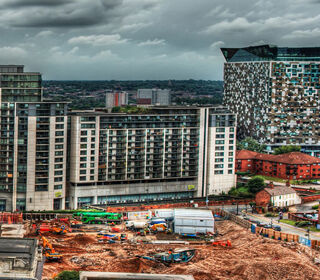
Blog Article

In the aftermath of World War II, a huge selection of England’s towns and cities were left irretrievably damaged by bombs. As a result, plans for redevelopment were swiftly put together to meet demand, resulting in radically-changed cities that bore little or no resemblance to what had come before. With a fresh sweep of redevelopments taking place in many of these cities, this research looks into two aspects – what the cities became and the processes behind them, and how we are managing these original changes in the present day.
The opportunity
The end of the Second World War resulted in hastily-planned urban change, due largely to extensive bomb damage. Cities such as Birmingham and Coventry fell foul of such occurrences, and both saw a massive amount of rebuilding in the years and decades after the War. Peter Larkham, Professor of Planning within Birmingham City University’s School of Engineering and the Built Environment, continues to conduct research into the processes behind these redevelopments and the results. However, with Birmingham in a continued state of regrowth and Coventry now a city of culture, Peter also assesses what areas of the previous redevelopment are being renovated and which parts are being conserved.
The delivery
Peter has given lectures at numerous institutions regarding the subject, and his twenty-year devotion to this specific research has seen him write an abundance of papers, attend numerous events, and offer his expertise to a vast variety of town and city planners.
Success to date
Together with fellow academic David Adams, now at the University of Birmingham, Peter has written a book on the redevelopments in Birmingham and Coventry. Set for release towards the end of 2019, Peter and David’s book will serve as a touchstone for the urban replanning and regenerations the two Midlands cities went through in the aftermath of World War II.
With the war still of such big interest to broad swaths of people, Peter was recently invited to talk about the subject at Gresham College in London, a lecture that has since generated thousands of downloads and views. David and Peter have also conducted a series of successful one-day workshops, improving the visibility and building contacts.
Looking to the future
Peter hopes to continue working with Heritage England and examine further what needs to be done with this relatively new built environment. Peter is also seeking external funding in order to use copyright images to embellish and evidence his work.
